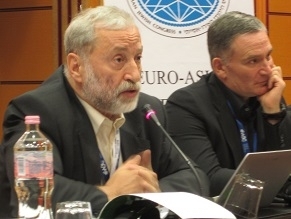|
Euroasian Jewish News

EAJC General Council Chairman Josef Zisels and EAJC President Vadim Shulman
|
EAJC General Council Session in Budapest
10.05.2013 On May 5-8, a session of the Euro-Asian Jewish Congress (EAJC) General Council took place in parallel to the Plenary Assembly of the World Jewish Congress.
EAJC President Vadim Shulman explained his vision of the further development of the Congress to General Council members. EAJC Secretary General Michael Chlenov delineated the internal processes of the World Jewish Congress, and stressed that the EAJC positions in theWJC governing bodies have become stronger. EAJC General Council Chairman Josef Zisels spoke on the programs and projects implemented by the EAJC in 2012.
Representatives of Jewish communities of Eastern European countries and countries of the Asian and Pacific region, who are currently deciding on acceptable ways of cooperation with the EAJC, also participated in the EAJC GC session. The EAJC leadership held negotiations on new communities joining the EAJC with representatives of Hong Kong, Serbia, Slovakia, and Montenegro. As a result of the negotiations, the Jewish community of Montenegro decided to join the EAJC and sent an official declaration of intent. The leadership of Serbia's Jewish community also decided to join the EAJC.
The EAJC leaders also held negotiations with representatives of the Jewish communities of Macedonia, Greece, and Bulgaria, during which possible support of the EAJC was discussed for a joint address to the government of Bulgaria to take responsibility for the participation of the Bulgarian army in the Holocaust of Thracian and Macedonian Jews. Due to a number of circumstances, this is a difficult matter. As it is known, the government of Bulgaria saved the Bulgarian Jewish population from death, but organized the deportation of Jews from neighboring territories, at that time controlled by the Bulgarian government, to death camps.
At the same time as the WJC Assembly and the EAJC General Council session, a Conference of Young Leaders and Activists of Eurasian Jewish Communities took place in Budapest, the members of which held a number of meetings and presented several projects planned to implement in their respective communities to the EAJC General Council.
|
